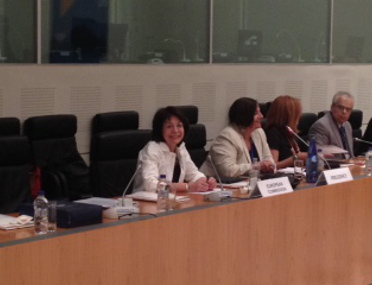Closing remarks at DISPA biannual meeting: "Resilience as a challenge for the Public Sector: The Institutes' and Schools' Contribution"

Commissioner Damanaki attended the bi-annual meeting of the Directors of Institutes & Schools of Public Administration of EU Member States in Athens. This year's session focused on "Resilience as a challenge for the Public Sector: The Institutes' and Schools' Contribution". Commissioner Damanaki delivered closing remarks on the European example. Read her fullspeech below.

Ladies and Gentlemen,
I am pleased to close this two-day conference which enabled a constructive discussion about on an important theme: «Resilience». Or as you put it in your working documents: how in the context of the economic crisis, the human capital of Public Administration can be sufficiently resilient in order to have the flexibility to adapt and to deliver more effectively.
I know from EKKDA, your Greek partner and host of the conference – which has now been in existence for over 30 years - the importance and the role that your institutes and Schools play in promoting excellence in public administration. EKKDA has certainly been a leading player in putting in place the major reforms we have had to make in Greece over the past few years.
We are in a challenging context of economic crisis and of deep changes in the EU. The results of the recent European elections have flagged important messages about the way and the pace in which we must move ahead. One thing is sure: we must change. Business as usual is not an option.
We need to improve the functioning of our States, and hence of our public administrations, in order to provide quick answers to the citizens’ concerns. To reduce burden while increasing the efficiency of public spending. To improve the quality of public administration so that it becomes a driver for competitiveness, by easing business climate and facilitating investments. The public administrations can and must contribute to the quest for economic growth and employment.
This is the reason why the reform of public administration is one of the five main priorities of the European Union's medium to long term strategy. The European Semester insists on the implementation of these reforms. The 4th Country-Specific Recommendations which were adopted by the Commission earlier this week placed emphasis on strengthening the conditions for sustainable growth and employment in a post-crisis economy. Modernising public administration was one of the key action strands
The theme of resilience that you have analysed in the course of your meetings here in Athens is particularly appropriate. You have covered its main facets: individual and organisational resilience.
It is not an overstatement to say that an organisation’s best capital is its human capital. We need to encourage our staff to build on their reserves of resilience. If we do not, we will not have a reliable and competent workforce. Organisations must also be resilient in the robustness, fairness and transparency in the way they operate. The need for this has become ever more apparent over recent years through the technological, economical and societal challenges. Although not everyone would always agree with the pace and scale of some of the changes that have been demanded, nobody can contest their necessity.
Change in times of crisis is inevitable. But it is also difficult task to inspire, let alone to implement. There is a positive aspect of change – and this is what we must explain to the citizens and the stakeholders. Change must not necessarily be disastrous. «Doing better», producing a more efficient and cost-effective service that contributes to economic growth, must not automatically translate into job losses and budget cuts. Here we need some good political answers. And we have to admit that the European leadership has not provided always such proposals timely, clearly and sufficiently.
There is a positive word for change. It is «Innovation». We live in a society that is reluctant to change, but which is prepared to welcome innovation. And there is plenty of public sector innovation to be found across Europe, as the European Pubic Sector Innovation Scoreboard which the Commission launched last year shows.
This is precisely why last European summit and the European Commission have placed so much emphasis on the need to modernise public administrations as part of its overarching strategy for economic growth. The public sector plays a key economic role as a regulator, service provider and employer, and accounts for around 25% of total employment and a significant share of economic activity in the Member States. If we want to build an economic recovery in the EU, then the public sector must play a major part.
Efficient exchange of information and best practices across borders are key elements in that respect. Your organisation makes a substantial contribution in consolidating and sharing the relevant experience, in setting up joint activities, in developing common training programmes and in organising traineeships and exchanges.
Ladies and gentlemen,
The European administration is not immune to the challenges of the reforms. Even if our relationship with the citizens is different from that of national, regional and local administrations, we have to see that the European elections sent clear messages. There is still a wide perception – whether or not justified – that the EU makes life harder for citizens and businesses. 74% of Europeans believe that the EU generates too much red tape. Addressing this issue will not only improve the EU's image among citizens but, more importantly, it will help create the kind of innovative and job-creating environment that Europe needs.
As President Barroso has said «the EU needs to be big on big things and smaller on small things» – Being smarter in the way we regulate is a major factor in helping businesses, in particular SMEs, to operate more successfully. Our REFIT programme has managed to cut the level of red tape by 26% since 2007, equivalent to savings of 32.3 billion euro per year for EU businesses. And there are proposals on the table that would increase level to 33% or 41 billion. The Commission has adapted the way it works, in particular with regard to the pre-legislative phase. There is now far wider consultation with stakeholders before proposals are put forward and comprehensive impact assessments are carried out on all new legislative proposals.
The Commission is of course conscious of the pressure that the financial crisis has put on national public administrations. We have to share some of that pain. The recent reforms of our Staff regulations will save 5.8 billion euros until 2020 on EU staff. The increase in working time alone to 40 hours per week will produce an extra amount of work worth 1.5 billion euro. This is money that the tax payers will not have to pay.
Ladies and gentlemen,
The Commission must practise what it preaches, about doing more and better with less, about being smart and innovative. The entire EU civil service must do the same.
At the closing of this fruitful two-day conference, I am pleased that the Commission, through the input of the European School of Administration, has been able to make a contribution to your reflections. I am sure you will go away with food for thought and new ideas for how to tackle these issues in each of your countries.
Thank you for your attention.


